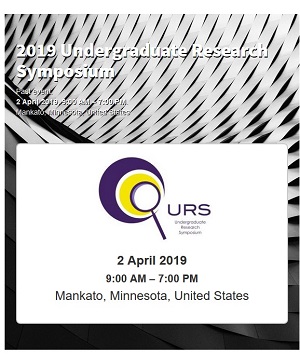Comparing Two Stress Reducing Interventions for College Students Significance of the Research Project
Location
CSU Ballroom
Start Date
2-4-2019 2:00 PM
End Date
2-4-2019 3:30 PM
Student's Major
Psychology
Student's College
Social and Behavioral Sciences
Mentor's Name
Carlos Panahon
Mentor's Department
Psychology
Mentor's College
Social and Behavioral Sciences
Description
Anxiety and stress are common among college students and come from many sources such as the pressures of making new friends, coping with lifestyle changes, and the pressure to be successful academically (Lent et al., 2002; Ross, Neibling, & Heckert, 1999). Britz and Pappas (2010) found that 51% of undergraduate students stated they are “often” or “always” stressed. As a result of the high levels of stress and anxiety and their negative effects, it is important to identify effective interventions that can help reduce these levels for college students. One effective class of interventions for addressing stress and anxiety is mindfulness-based interventions (MBIs). MBIs emphasize the regulation of attention with a focus on being present, open, and accepting (Carsley, Heath, & Fajnerova, 2015). The research within this area is generally promising. Therefore, it is important to compare stress reducing techniques within the college setting. This study compared a brief MBI (coloring a mandala) to a brief stress reduction seminar in a sample of 83 college-aged adults. Participants were randomly assigned to either condition. They completed the State Trait Anxiety Inventory to determine their stress state, and a survey of perceived effectiveness and use of MBIs before and after the intervention. Both interventions significantly reduced stress state and trait levels for all participants. The participants stated that each condition was acceptable, and that they would easily be able to practice mindfulness-based activities.
Comparing Two Stress Reducing Interventions for College Students Significance of the Research Project
CSU Ballroom
Anxiety and stress are common among college students and come from many sources such as the pressures of making new friends, coping with lifestyle changes, and the pressure to be successful academically (Lent et al., 2002; Ross, Neibling, & Heckert, 1999). Britz and Pappas (2010) found that 51% of undergraduate students stated they are “often” or “always” stressed. As a result of the high levels of stress and anxiety and their negative effects, it is important to identify effective interventions that can help reduce these levels for college students. One effective class of interventions for addressing stress and anxiety is mindfulness-based interventions (MBIs). MBIs emphasize the regulation of attention with a focus on being present, open, and accepting (Carsley, Heath, & Fajnerova, 2015). The research within this area is generally promising. Therefore, it is important to compare stress reducing techniques within the college setting. This study compared a brief MBI (coloring a mandala) to a brief stress reduction seminar in a sample of 83 college-aged adults. Participants were randomly assigned to either condition. They completed the State Trait Anxiety Inventory to determine their stress state, and a survey of perceived effectiveness and use of MBIs before and after the intervention. Both interventions significantly reduced stress state and trait levels for all participants. The participants stated that each condition was acceptable, and that they would easily be able to practice mindfulness-based activities.
Recommended Citation
Jewell, Madison. "Comparing Two Stress Reducing Interventions for College Students Significance of the Research Project." Undergraduate Research Symposium, Mankato, MN, April 2, 2019.
https://cornerstone.lib.mnsu.edu/urs/2019/poster-session-B/8




